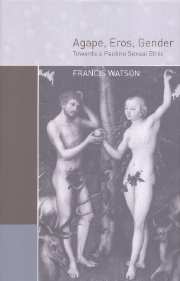4 - The Tombs of Desire
Published online by Cambridge University Press: 22 September 2009
Summary
In the Freudian model of the self, Paul's portrayal of the ego as torn between the demands of law and flesh reappears in twentieth-century guise. The old language has been modernized, fitting it for a new career within a twentieth-century discourse on sex whose repeated announcements of a turning-point between the old era and the new it effectively subverts. Yet, if within Freud's texts there occurs a ‘reading’ of a Pauline text, this is clearly also a misreading. Little or nothing survives of the context in which the Pauline language has its natural habitat. That is of course deliberate: Freud's texts are resolute in their rejection of the ‘illusion’ on whose stories and traditions they continue to draw. But if we do not reject those stories and traditions, if we continue to regard them as embodying truth rather than illusion, the relationship of the ancient and the modern texts will be reversed. Paul will no longer be the precursor of Freud – a source for certain of his conceptual moves, apparently unrecognized by Freud himself or by his interpreters. Instead, Freud will be the precursor of Paul. A reading of Freud as subverting the discourse of sexual liberation is already a Pauline (and Augustinian) reading of Freud; and perhaps also – at least on some criteria – a misreading.
- Type
- Chapter
- Information
- Agape, Eros, GenderTowards a Pauline Sexual Ethic, pp. 129 - 182Publisher: Cambridge University PressPrint publication year: 2000

